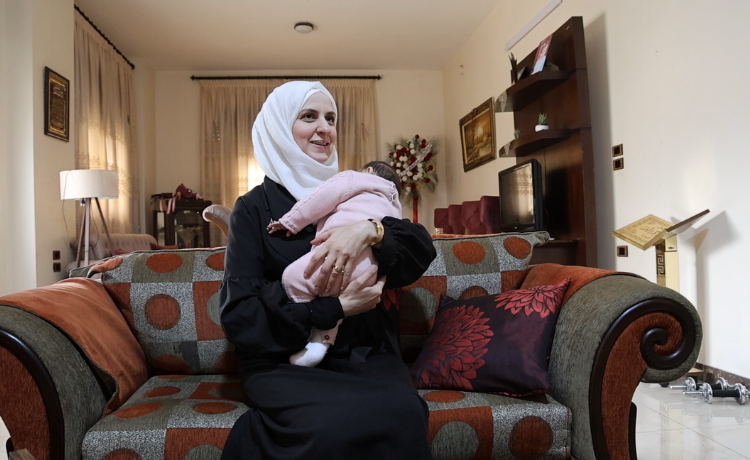News
Attacked, understaffed, underfunded: Healthcare shortages endanger pregnant women in north-west Syria
- 23 October 2024
News
IDLIB, Syrian Arab Republic – Ongoing conflict and instability continue to severely disrupt life in north-west Syria, straining medical supply stocks and overwhelming the capacity of healthcare workers. Pregnant women with obstetric complications are among those most at risk.
"Many women in north-west Syria lose their lives while being transferred between hospitals in the absence of essential supplies for critical conditions like placental abruption," Dr. Ikram Haboush, the director of the Specialized Maternity Hospital in Idlib, Syria, told UNFPA, the UN sexual and reproductive health agency.
Placental abruption is a life-threatening condition in which the placenta separates from the uterine wall; it can result in maternal and fetal death.
Khansa Harbeh, 35, was diagnosed with the condition when she was in her second trimester of pregnancy. “I was terrified and desperately searched for a well-trained doctor who could handle my case,” she told UNFPA.
Attacked, understaffed, underfunded
Health facilities have been the site of attacks in the ongoing hostilities, with 14 attacks reported in Idlib in the last quarter of 2023. More than a third of hospitals in Syria are partially or fully damaged, according to recent reporting, and many districts, including Idlib, have healthcare staff-to-population ratios well below international standards.
The situation for pregnant women is even more stark. Half of maternity hospitals in north-west Syria had suspended operations as of September, affecting approximately 1.3 million women of reproductive age. Some 63 emergency obstetric and newborn care facilities are operational in the north-west, but 30 of these facilities are out of funds and at risk of closing.
Even before the recent escalation in conflict, health infrastructure in Syria was struggling to recover. The devastating 2023 earthquake affected millions of people living along the border between Turkiye and Syria. Hundreds of health facilities in Syria were rendered totally nonfunctional in the aftermath.
Now, thousands of displaced Syrians are returning to the area to escape intensifying hostilities in Lebanon, even as north-west Syria contends with shelling and airstrikes. Amid all of this, the health system continues to falter.
Humanitarian appeal launched

“Placental abruption is a serious emergency that requires immediate intervention,” obstetrician Dr. Abdul Aziz Hamza told UNFPA. He treated Mrs. Harbeh and spoke about her situation with her consent.
“We knew we had to act fast to save both the mother and her baby. The situation was critical, but we were prepared.”
Fortunately, Idlib Maternity Hospital, where Mrs. Harbeh received care, had the staff and supplies to attend to her. “They assured me that the required blood tests and check-ups were available there,” she said.
“The doctors and staff monitored us closely at night, checking both my and my baby’s vital signs.” In the end, her baby was delivered safely.
The hospital is supported by UNFPA, which has appealed for $66 million to respond to the humanitarian needs in the country. Some $23 million of this is needed just to avoid the suspension of services in 30 emergency newborn and obstetric facilities in north-west Syria.